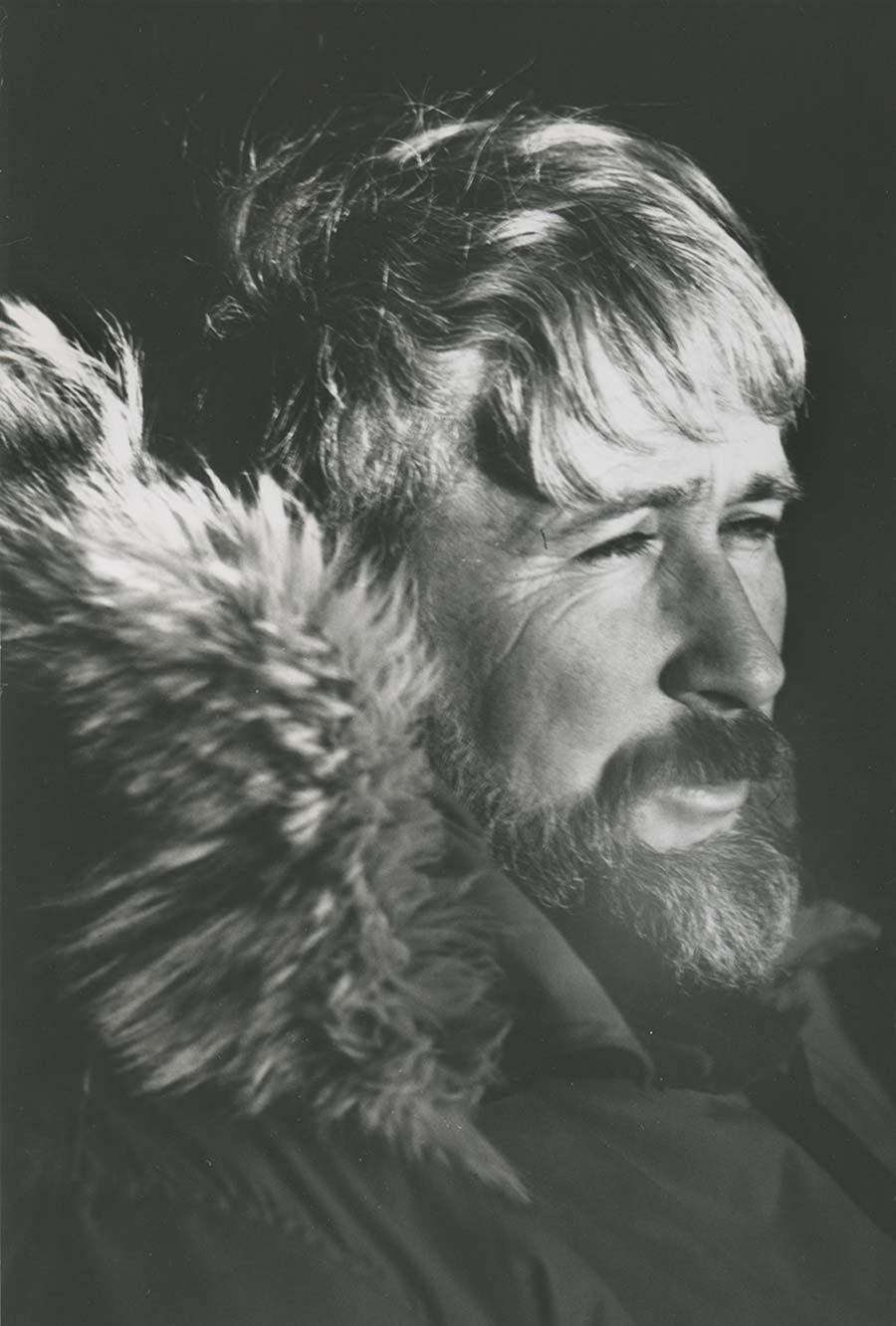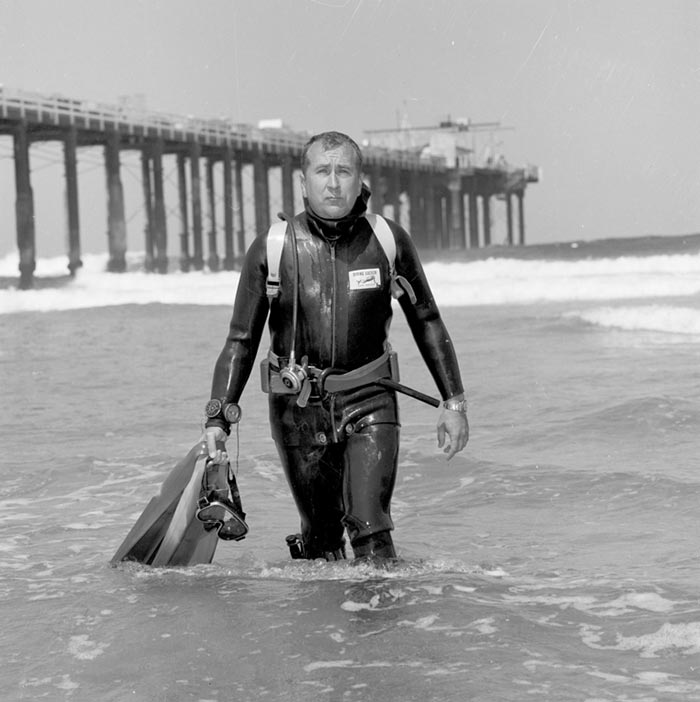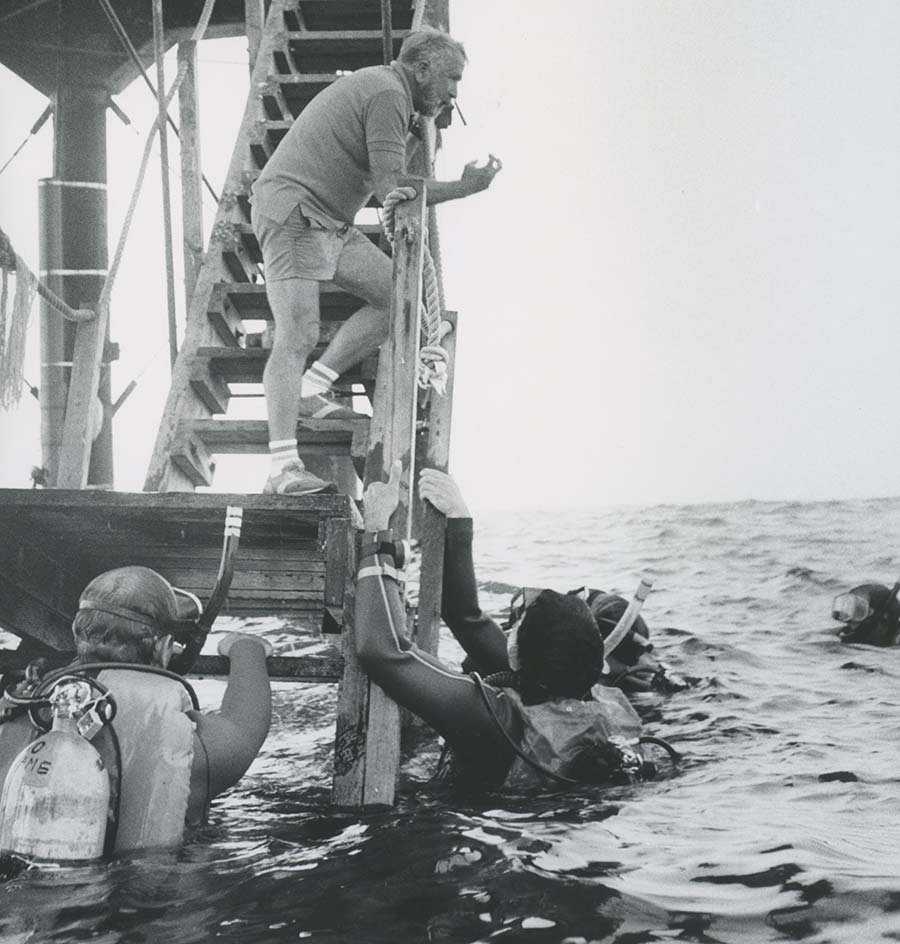Obituary Notice: James (Jim) Stewart, Pioneering Diving Officer
Associated with Scripps since the 1950s, Stewart revolutionized scientific diving programs
By:
- Brittany Hook
Media Contact:
- Brittany Hook - bhook@ucsd.edu
- Lauren Fimbres Wood - lmwood@ucsd.edu
Published Date
By:
- Brittany Hook
Share This:
Article Content

James "Jim" Stewart, Diving Officer, Scripps Institution of Oceanography, University of California San Diego. McMurdo, Antarctica, 1974.
James “Jim” Ronald Stewart, chief diving officer emeritus at Scripps Institution of Oceanography at the University of California San Diego, died June 7 in Irvine, Calif. at the age of 89.
Stewart was a renowned diving expert and had been affiliated with Scripps Oceanography since 1952. As diving officer from 1960 until his retirement in 1991, he managed the nation's oldest and largest nongovernmental research diving program, which became the model for safe and effective conduct of international research diving programs.
“Jim was a true pioneer and a giant to those of us that work in the ocean realm,” said Christian McDonald, current scientific diving safety officer at Scripps. “He was a mentor to generations of divers, diving scientists, and diving safety professionals around the world. I, and so many others, find it a great privilege to have learned from and to count Jim as a good friend.”
Born Sept. 5, 1927, Stewart was a native of San Diego and began diving in 1941—before the use of scuba. At the age of 14, he first borrowed a friend's dive mask at La Jolla Cove. He put his head under water, started freediving, and quickly became a very accomplished freediving spear fisherman in high school. Stewart was drafted in the final year of World War II and went into the Army Air Corps in Nome, Alaska. Upon returning home in 1951, he became a member of the Bottom Scratchers, the world’s oldest freediving club. Stewart was the youngest member of the exclusive club, which changed the sport of breath-hold diving and revolutionized the use of equipment such as facemasks, fins, and spearfishing guns.
Stewart received a bachelor of arts degree from Pomona College in 1953 and his general teaching credentials from San Diego State College in 1958. In addition, he studied marine botany at the graduate level at the University of Southern California and University of Hawaii.

Jim Stewart, Diving Officer, in his scuba gear, 1965. Photo: Special Collections & Archives, UC San Diego
In the early 1950s, Stewart was one of a dozen individuals at Scripps who began developing training procedures and data collecting techniques that would allow scientists to use diving as a means of conducting underwater research. During the early 1960s, he developed the original University Guide for Diving Safety, which created a means for establishing reciprocal research diving programs throughout the University of California system and various state and federal agencies.
Stewart was a legendary presence at Scripps and within the larger diving community. While conducting research diving off Wake Island (North Pacific Ocean) in 1961, Stewart was attacked by a gray reef shark. Hit twice on the right elbow, the bites cut the joint capsule and two arteries. With his diving experience and the aid of friend Ron Church, he was able to escape and avoid further injuries. He was flown to a Hawaiian hospital and eventually made a full recovery.
Stewart directed and participated in numerous kelp bed field projects in which he trained staff and students in the art of kelp bed diving, which was a true passion of his. He once said, “If you've ever swum through a kelp bed, it's kind of like swimming through a forest, one of the more beautiful places you'll ever be.”
His work on such projects led to many shipboard diving and collecting trips for the University of California. The scientific community recognizes Stewart as an expert on the interactions of divers and the marine environment, including marine mammals.

Jim Stewart leading a scientific diving course from Scripps Pier at Scripps Institution of Oceanography, UC San Diego.
Since 1967, Stewart was responsible for the training and evaluation of all scientists, regardless of nationality, conducting research diving in the Arctic and Antarctic oceans under the auspices of the National Science Foundation’s Division of Polar Programs, a position he maintained even after his retirement from Scripps.
In addition to the Arctic and Antarctic, Stewart dived throughout much of the world, including the Atlantic and Pacific oceans, Gulf of Mexico, and Mediterranean Sea.
Stewart served as a consultant to NASA, for which he participated in the development of techniques used in the underwater training of astronauts for extravehicular activity. In the mid-1990s, he formed a national committee to evaluate the engineering concepts necessary for creating a wet training facility for the international space station.
Jim’s accolades were numerous and include the AAUS Scientific Diving Lifetime Achievement (2001), the inaugural Conrad Limbaugh Memorial Award for Scientific Diving Leadership from the AAUS (2001), the Roger Revelle Trophy from the San Diego Oceans Foundation (2001), induction as one of the first members of the National Association of Underwater Instructors Hall of Honor (2000), the National Conservation Award from the secretary of the U.S. Department of the Interior (1992), and election to the Diving Hall of Fame, concurrent with being honored with the first Pioneer Award, from the Diving Equipment Manufacturers Association (1991).
In 2003, in honor of his years as diving officer for the National Science Foundation's Office of Polar Programs, the U.S. Board of Geographic Names conferred the name "Stewart Peak" on a 1,097-meter mountain in Antarctica in his honor.
Stewart was a member of the State of California Parks and Recreation Department Board on Underwater Parks and Reserves, the Coroner’s Expert Committee on Diving Related Deaths, the Scuba Advisory Committee for National Cooperation in Aquatics, the National Association of Underwater Instructors (NAUI) Advisory Committee, and the San Diego/La Jolla Underwater Park Board. In addition, he served as diving consultant to the U.S. Coast Guard, NASA, FBI, U.S. Army Special Forces, National Park Service, and many universities nationwide. He was the last surviving member of the Bottom Scratchers.
Stewart is survived by his wife of 64 years, Joan, son Craig, daughter Meredith, and four grandchildren.
Memorial services will be held at a later date.
Colleagues wishing to express condolences are invited to submit messages for web posting to scrippsnews@ucsd.edu.
Share This:
You May Also Like
Stay in the Know
Keep up with all the latest from UC San Diego. Subscribe to the newsletter today.



